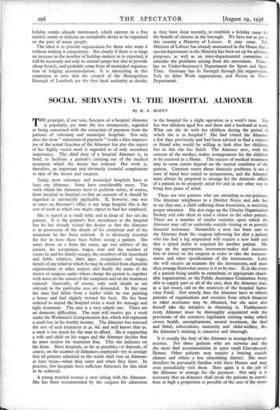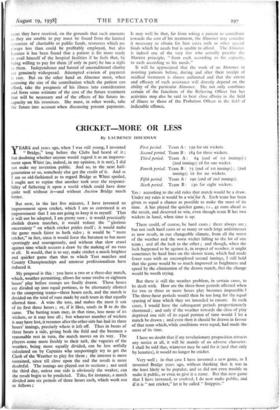SOCIAL SERVANTS : VI. THE HOSPITAL ALMONER
By R. F. SCOTT
THE principal, if not sole, function of a hospital Almoner is popularly, yet none the less erroneously, regarded as being concerned with the extraction of payment from the patients of voluntary and municipal hospitals. Not only does the term " extraction of payment " evoke a false impress- ion of the actual function of the Almoner but also this aspect of her highly varied work is regarded as of only secondary importance. The chief duty of a hospital Almoner is, in brief, to facilitate a patient's carrying out of the medical- treatment which the doctor has ordered. Her work is, therefore, an important and obviously essential complement to that of the doctor and surgeon.
Today most voluntary and municipal hospitals have at least one Almoner. Some have considerably more. The work which the Almoners have to perform varies, of course, from hospital to hospital, so that no account of it should be regarded as universally applicable. If, however, one was to enter an Almoner's office at any large hospital this is the sort of work at which one might expect to find her employed.
She is seated at a small table and in front of her sits the patient. It is the patient's first attendance at the hospital but he has already visited the doctor so that the Almoner is in possession of the details of his complaint and of the treatment he has been ordered. It is obviously essential for her to have these facts before seeing a patient. She notes down on a form the name, age 'and address of the patient, his occupation, wages, rent and the number of rooms he and his family occupy, the members of his household and liable relatives, their ages, occupations and wages, details of any relief to which he may be entitled from charitable organisations or other sources and finally the name of the doctor or surgeon under whose charge the patient is, together with notes on the nature of the complaint and on the treatment ordered. Generally, of course, only such details as are relevant to the particular case are demanded. In this case the man had fallen from a ladder while he was painthig a house and had slightly twisted his back. He has been ordered to attend the hospital twice a week for massage and light treatment. The case is a very simple one. There are no domestic difficulties. The man will receive 3os. a week under the Workmen's Compensation Act, which will represent a small loss in his weekly income. The Almoner has assessed the cost of each treatment at 4s. 6d. and well knows that 9s: a week is too much for the man to afford. He is supporting a wife and child on his wages and the Almoner decides that he must receive his treatment free. This she indicates on the form. Most hospitals, so far as possible,—it depends, of course, on the number of Almoners employed—try to arrange that all patients admitted to the wards shall visit an Almoner at least twice—when they enter and when they leave. In practice, few hospitals have sufficient Almoners for this ideal to be achieved.
A young married woman is now sitting with the Almoner. She has been recommended by the surgeon for admission to the hospital for a slight operation in a week's time. She has two children aged five and three and a husband at work. What can she do with her children during the period in which she is in hospital ? She had visited the Almoner a few days previously and had been advised to find a relative or friend who would be willing to look after her children, but in this she has 'failed. The Almoner now, with the consent of the mother, makes arrangements for the children to be received in a Home. The success of medical treatment may to some extent depend on the mental condition of the patient. ' Constant worry about domestic problems is not a state of mind best suited to recuperation, and the Almoner must always be prepared to arrange for the domestic affairs of a patient to be properly cared for and in any other way to bring him peace of mind.
There are two patients who are attending as out-patients. The Almoner telephones to a District Nurse and asks her to see that one, a child suffering from bronchitis, is receiving proper attention. She also rings up the Charity Organisation Society and asks them to send a visitor to the other patient. There are .a number of similar societies upon which the Almoner may call to undertake outside visiting or to provide financial assistance. - Meanwhile a note has been sent to the Almoner froth the surgeon informing her that a patient who has had a leg amputated will require a new limb and that a spinal jacket is required for another patient. She rings up the appropriate instrument-maker and instructs him to attend on the surgeon in order to take the measure- ments and other specifications of the instruments. Later she will receive an estimate for the instruments, and must then arrange from what source it is to be met. Kin the event of a patient being unable to contribute, or appropriate charit- able organisations or the Public Assistance Committee being able to supply part or all of the cost, then the Almoner may, as a last resort, call on the resources of the hospital Sama- ritan Fund. Not merely does the Almoner - have to inform patients of organisations and societies from which financial or other assistance may be obtained, but she must also herself take the initiative in obtaining it. Furthermore every Almoner must be thoroughly acquainted with the provisions of the extensive legislation existing today which covers health, unemployment, mental treatment, the deaf and blind, tuberculosis, maternity and child-welfare, &c. An Almoner's training is extensive and thorough.
It is usually the duty of the Almoner to arrange for conval- esCence. For those patients who are nervous and -shy she must find • accommodation in- quiet small. Convalescent Homes. Other patients may require' a bracing seaside climate and others a less stimulating district. She must therefore be personally familiar with these Homes and may eves periodically visit them. Here again it is the job of the Almoner to arrange for the payment. Not only is it necessary that an Altneater shall invite "the-patients to contri- bute as high a proportion as possible of the cost of the treat- ment they have received, on the grounds that such amounts as they are unable to pay must be found from the limited resources of charitable or public funds, resources which are al wayi less than could be profitably employed, but also because it has been found that a patient is far more ready to avail himself of the hospital facilities if he feels that, by being willing to pay for them (if only in part) he has a right to them. Independence and hatred of unconditional charity are genuinely widespread. Attempted evasion of payment is rare. But on the other hand an Almoner must, when assessing the size of the contribution which the patient can afford, take the prognosis of his illness into consideration and form some estimate of the cost of the future treatment that will be necessary and of the effects of his future in- capacity on his 'resources. She must, in other words, take the future into account when discussing present payments. It may well be that, far from asking a patient to contribute towards the cost of his treatment, the Almoner may consider it necessary to obtain for him extra milk or other special foods which he needs but is unable to afford. The Almoner is indeed one of the very few who actually practise the Marxist principle, " from each according to his capacity, to each according to his needs."
It will be appreciated that the work of an Almoner in assisting patients before, during and after their receipt of medical treatment is almost unlimited and that the extent and efficacy of such assistance will directly depend on the ability of the particular Almoner. She not only combines certain of the functions of the Relieving Officer but her activities may also be said to bear close affinity in the field of illness to those of the Probation Officer in the field of indictable offence.







































 Previous page
Previous page